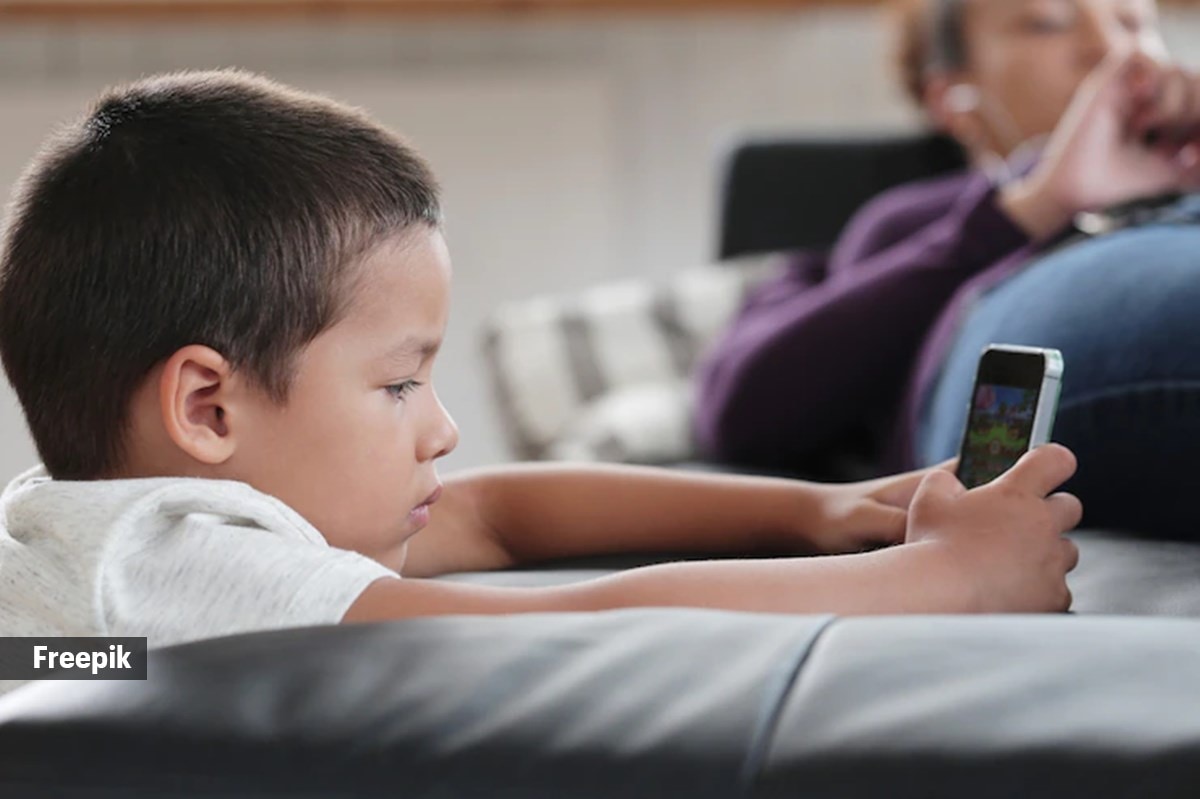📣 For more lifestyle news, click here to join our WhatsApp Channel and also follow us on Instagram
Anand Mahindra warns against dangers of early smartphone use by children: ‘Incredibly disturbing’
"I join many others in urging parents to exercise caution & restraint," Anand Mahindra wrote on Twitter.
 "Incredibly disturbing. Research being conducted by Sapien Labs and Krea University, AP, shows that the age at which a child first owns a smartphone affects their mental well-being in adulthood. I join many others in urging parents to exercise caution & restraint," he wrote. (Source: File Photo/ Freepik)
"Incredibly disturbing. Research being conducted by Sapien Labs and Krea University, AP, shows that the age at which a child first owns a smartphone affects their mental well-being in adulthood. I join many others in urging parents to exercise caution & restraint," he wrote. (Source: File Photo/ Freepik)Smartphones have become a ubiquitous part of our lives — for adults and children alike. Children all around the globe use smartphones for various purposes, from talking to their friends or playing games to using social media and watching videos. While technology is an incredible educational tool, it has its own drawbacks — and quite a few at that. According to a 2020 survey done by the Pew Research Center, 60% of children were exposed to smartphones before age 5.
Recently, Anand Mahindra shared research published by Sapien Labs and Krea University, which showed the link between the mental well-being of an adult with the age at which they first used a smartphone.
“Incredibly disturbing. Research being conducted by Sapien Labs and Krea University, AP, shows that the age at which a child first owns a smartphone affects their mental well-being in adulthood. I join many others in urging parents to exercise caution & restraint,” he wrote.
Incredibly disturbing. Research being conducted by Sapien Labs and Krea University, AP, shows that the age at which a child first owns a smartphone affects their mental well-being in adulthood. I join many others in urging parents to exercise caution & restraint.… pic.twitter.com/VUThRA06Fe
— anand mahindra (@anandmahindra) May 15, 2023
Data from the global study conducted by Global Mind Project examined the effect of growing up with a smartphone or tablet and discovered how mental well-being consistently improved with an older age of smartphone ownership. The survey carried out between January and April 2023 involved 27,969 individuals aged between 18 to 24 and assessed the mental health quotient (MHQ) scores of participants with the reported age at which they obtained their first smartphone or tablet. It revealed a concerning trend of declining mental health among young people due to smartphone use.
It found that there was a significant improvement in mental wellbeing with an older age of smartphone ownership, with better results in females compared to males. It also highlighted a decrease in issues such as aggression, suicidal thoughts, detachment from reality and hallucinations with a rise in the age of first smartphone ownership.
 Data from the global study conducted by Global Mind Project examined the effect of growing up with a smartphone or tablet and discovered how mental wellbeing consistently improved with an older age of smartphone ownership. (Source: Freepik)
Data from the global study conducted by Global Mind Project examined the effect of growing up with a smartphone or tablet and discovered how mental wellbeing consistently improved with an older age of smartphone ownership. (Source: Freepik)
Moreover, getting a smartphone at a younger age, especially before the age of 10, was linked with clinically distressed mental health status among females. While this connection was less severe among males, it still showed that better mental wellbeing was linked to an older age of smartphone ownership.
Explaining this, Dr. Jyoti Kapoor, Founder-Director and Senior Psychiatrist, Manasthali said, “Smartphones contribute to an increase in screen time among children, which can have negative effects on their mental health. Excessive screen time has been linked to issues like poor sleep quality, sedentary behavior and decreased physical activity. Moreover, it can lead to reduced face-to-face interactions, limiting social skills development, and increasing feelings of isolation.”
Additionally, she noted that smartphones provide easy access to social media platforms where children often encounter carefully curated images and posts, leading to comparisons and negative self-perception. “The pressure to conform to unrealistic standards portrayed on social media can lead to lowered self-esteem, body image issues, and feelings of inadequacy. This constant exposure to carefully constructed online identities can negatively impact a child’s mental well-being,” Dr Kapoor added.
On similar lines, Dr Ritika Agarwal, Clinical Psychology, Jaslok Hospital & Research Centre said, “There are recommendations on screen time (mobiles, computers, TV, etc) for children across all age groups. Parents are recommended to increase the opportunity for face-to-face peer interactions for their children.”
Concluding, she said, “While there are concerns associated with excessive smartphone usage, smartphones can also be used for positive development. For the same, parents can build a library of educational material that can help their child with building vocabulary and concepts.”
📣 For more lifestyle news, follow us on Instagram | Twitter | Facebook and don’t miss out on the latest updates!
📣 For more lifestyle news, click here to join our WhatsApp Channel and also follow us on Instagram





- 01
- 02
- 03
- 04
- 05






















